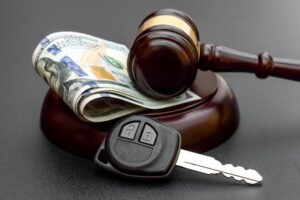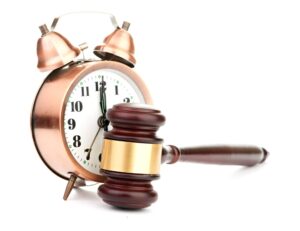How Do You File a Car Accident Claim Against a Government Entity?
Did you recently suffer harm in a car accident that involved a government entity in some capacity? You might have a claim against the government if the accident was due to something that was the government’s responsibility, like a broken traffic light. Winning a claim against the government is tough, but it is possible in certain situations with the help of a knowledgeable car accident lawyer.
When Could the Government Be Liable for a Car Accident?

In countless scenarios you can hold the government liable for a car accident.
Here are just a few examples:
- Negligent Driving by a Government Employee: If a government employee drives a government-owned vehicle recklessly or carelessly while working and causes an accident, you can hold the government liable.
- Poor Road Maintenance: Local governments must maintain roads. If an accident occurs because of a pothole, unclear road signs, or other maintenance issues, the government entity in charge of road upkeep might bear responsibility.
- Malfunctioning Traffic Lights: If a traffic light is not working properly and a government entity fails to fix it in a timely manner, you can hold the government at fault for any resulting accidents.
- Poor Road Design: Sometimes, the fundamental design of a road increases accident risk. For instance, sharp turns without proper signage might increase the chance of rollovers, especially for larger vehicles. In such cases, you can hold the entity responsible for road design liable.
- Inadequate Snow or Ice Removal: If a government entity does not clear the roads effectively after a snowstorm, and this leads to an accident, you can hold them responsible for any harm or losses that result.
- Lack of Adequate Signage: The government must provide proper signage on roads to alert drivers of hazards or changes in traffic patterns. Missing or hidden signs that contribute to accidents could render the government liable.
- Faulty Government Vehicle Maintenance: If the government fails to properly maintain a vehicle, and a preventable malfunction causes an accident, you can hold the government accountable.
- Inadequate Training of Government Drivers: Government entities that directly employ drivers must train those drivers properly. Crash victims could have grounds for a government claim if an accident occurs because a government driver did not receive appropriate training.
- Construction Zone Negligence: Government entities often oversee construction zones in public spaces. You can hold the government responsible if it fails to manage an area safely and an accident happens as a result.
- Failure to Address Known Hazards: If a government entity does not take action to fix a known hazard on the road, and it leads to an accident, you can hold the government liable.
How Are Government Claims Different From Standard Car Accident Claims?
Filing a claim against a government entity after a car accident is not the same as filing a claim against another driver or their insurance company. Here are the key ways that government claims differ from standard car accident claims:
Notice Requirements
One of the first differences you’ll encounter when filing a claim against a government entity is the strict requirement to provide notice of your claim. It’s a legal requirement with a deadline that’s usually between 30 to 180 days after the accident, depending on the jurisdiction.
In your notice, you must typically include specific details about the claim, such as the accident date, location, and circumstances. You’ll usually want to include a description of the injuries and damages you’re claiming, too.
Failure to adhere to the appropriate filing deadline or to include all necessary information could result in the dismissal of your claim before it even gets started.
Special Forms
Unlike in the standard car accident claims process, where you might simply contact the insurance company, claims against government entities often require you to complete specific forms.
These forms are often detailed and require information not typically necessary in regular insurance claims, such as a precise legal theory of why the government is liable.
Correctly completing these forms is essential because any errors could delay the process or lead to the denial of your claim. This is where the help of an attorney can make all the difference. Your attorney can identify all necessary documents and forms for your claim and fill everything out while you focus on recovery.
Limited Time to Sue

If you do not settle your government claim during the administrative phase, you might decide to take your claim to court. If you do, you’ll find that the timeframe for initiating a lawsuit against a government entity is usually much shorter than it is for suing a private party.
Oftentimes, you’ll have just six months to a year to file a lawsuit against a government entity. Waiting too long to sue could mean losing your legal rights to seek compensation, no matter how strong your underlying case might be.
Caps on Damages
Another major difference is that many government entities have limits or damages caps on how much money you can recover from your accident claim. These caps can limit the amount you can recover for certain losses, such as pain and suffering, and they often apply no matter how severe your injuries are.
If the accident happens in an area with a damages cap for government claims, it could affect the amount of money you can claim for your losses. So, even if the total amount you are due exceeds the cap, you cannot recover more than the maximum amount allowable by law.
Sovereign Immunity
Sovereign immunity is a legal doctrine that says you cannot sue the government without its consent. While many governments have waived this immunity to some extent for car accident claims, many restrictions and conditions are still in place.
For instance, the government could enjoy complete immunity for certain types of incidents or levels of negligence, which could make it more difficult for you to prove your case.
Different Investigation Processes
The government will likely investigate your claim differently than an insurance company would in a standard car accident claim. Government investigations could involve different government agencies and often take more time.
For instance, a government entity may conduct its own internal investigation rather than relying on police reports.
The government might also have different standards for what constitutes sufficient evidence to support your claim. This could lead to delays and potentially a less favorable interpretation of the facts, as the government might be more focused on defending its interests than on being scrupulously fair.
Understanding how the government will handle your claim can prepare you for what information you must provide and what to expect during the investigation.
Varied Insurance Coverage
Finally, insurance coverage for government vehicles does not always work the same way as it does for private vehicles. The government might self-insure, which means it handles claims and payouts directly rather than through an insurance provider.
This could affect how negotiations play out, the amount of compensation available, and the overall strategy for pursuing your claim.
What Is the Typical Process for Filing a Government Claim?
No matter where you are or which government entity is liable, filing a government claim after an accident will follow similar steps.
Here’s a broad overview of the government claims process:
- Document the Accident: Collect as much information as possible. Take pictures of the scene, even if you must return later to do so. Gather contact information from witnesses and obtain a copy of the police report. This documentation will provide essential support for your claim.
- Determine the Correct Government Entity: Next, identify which government entity is responsible. Depending on the situation, this could be a city, county, state, or federal agency. Knowing the right entity is necessary to ensure you file your claim correctly.
- Notify the Government: Obtain the appropriate notice of claim form from the responsible government entity. Fill out this form with detailed information about the accident, your injuries, and related losses. Make sure to complete it accurately to avoid any delays.
- File the Claim Within the Deadline: Submit your claim form within the necessary time frame, which is usually quite short for government claims. Missing a filing deadline, even by a few days, could disqualify your claim.
- Wait for a Response: After you file the claim, the government entity will review it. This process could take several months, during which time you should maintain records of any ongoing expenses related to the accident. This includes medical expenses, income losses, and repair costs.
- Negotiate a Settlement: If the government accepts your claim, they might offer you a settlement. But remember that the first settlement offer rarely reflects the true value of your claim. Your lawyer can negotiate to reach an agreement that adequately addresses the harm you suffered.
- Consider Legal Action if Necessary: If the government denies your claim or you can’t agree on a settlement, you might need to file a lawsuit. Consult your attorney to understand your options and the likelihood of success.
Are There Different Procedures for Filing Claims Against Local, State, and Federal Government Entities?

Yes. When dealing with a local government entity, such as a city or town, you often have to file a claim directly with the city clerk or other local office.
In some cases, you might even need to file with the specific department responsible for the issue that led to the accident. These entities often have their own forms and deadlines, which are usually quite strict.
You typically need to file with the state’s treasury or risk management department for state government claims. The state will have its own set of forms and procedures, and the timeframe for filing a claim can differ from that of local governments.
Some states may limit how much compensation you can seek.
Filing a claim against the federal government follows a different set of rules under the Federal Tort Claims Act (FTCA). You would need to file a Standard Form 95 to start the claim process. This form asks for detailed information about the claim, and you must file it within two years of the incident. Each step of the process with the federal government is more formal and complex than filing with local or state government entities.
Whether you have a claim against a local government, the state, or the federal government, you need and deserve professional representation. A lawyer will know all the requirements and details necessary for each type of claim.
How Do I Determine Which Government Entity Is Liable for My Car Accident Claim?
To determine which government entity is liable after a car accident, you must look at several factors.
First, consider the location of the accident. The local city government might be responsible if it happened on a city street. The state’s transportation department could be liable for accidents on state roads or highways.
And you can hold the federal government at fault if the accident involved a federal government vehicle or it occurred on federal property, like a national park.
Next, look into what caused the accident. If a poorly maintained road or a malfunctioning traffic signal was the cause, the entity in charge of maintenance – often a city or state public works department – could be liable.
If the driver of a government vehicle, like a postal truck or police car, caused the accident, the specific government agency that operates the vehicle is likely responsible.
Even if you’re reasonably sure which entity to hold accountable, you should contact a lawyer for professional assistance. They can investigate who is in charge of the area or the vehicle that caused the accident. This way, you make sure you’re filing a claim against the right government body.
What Types of Evidence Do I Need to Support a Car Accident Claim Against the Government?

Solid evidence is particularly important in government liability claims.
The best way to support your claim is to work with a seasoned personal injury lawyer who can identify, preserve, and present useful evidence, such as:
- Accident scene photographs
- Police accident reports
- Witness statements
- Traffic surveillance camera footage
- Vehicle damage reports
- Medical records of your injuries
- Expert testimony on road safety
- Government vehicle maintenance records
- Weather and traffic reports from the accident date
- Road maintenance records
- Government employee driving records
- Emergency response records
- Forensic analysis of the crash site
- Road design documents
- Correspondence with government officials
- Dashcam video footage
- Copies of government policies and procedures
- Testimony from accident reconstruction specialists
Free Consultation
We Are Here For You 24/7
Reviews
– Elissa M.
“Really pleased with Boohoff Law! Received immediate responses when I had any questions. Treated amazingly by all staff … made this process a true breeze!”
– Caitlyn M.
– Brandy K.
Related Posts
How Can Dashcam or GoPro Footage Help My Motorcycle Accident Case?
What Happens if the Trucking Company Claims I Was in the Blind Spot?
Wrecked by a Semi in a Pile-Up? How To File a Claim if You Were Injured in a Multi-Vehicle Truck Crash
Recovery is personal.
We’re here for you.
We’re close by. And if you can’t make it to us, we’ll meet you where you need us, at home or in the hospital.
You're better off with Boohoff.











The information on this website is for general information purposes only. Nothing on this site should be taken as legal advice for any individual case or situation. This information is not intended to create, and receipt or viewing does not constitute, an attorney-client relationship.
available 24/7
(877) 999-9999
